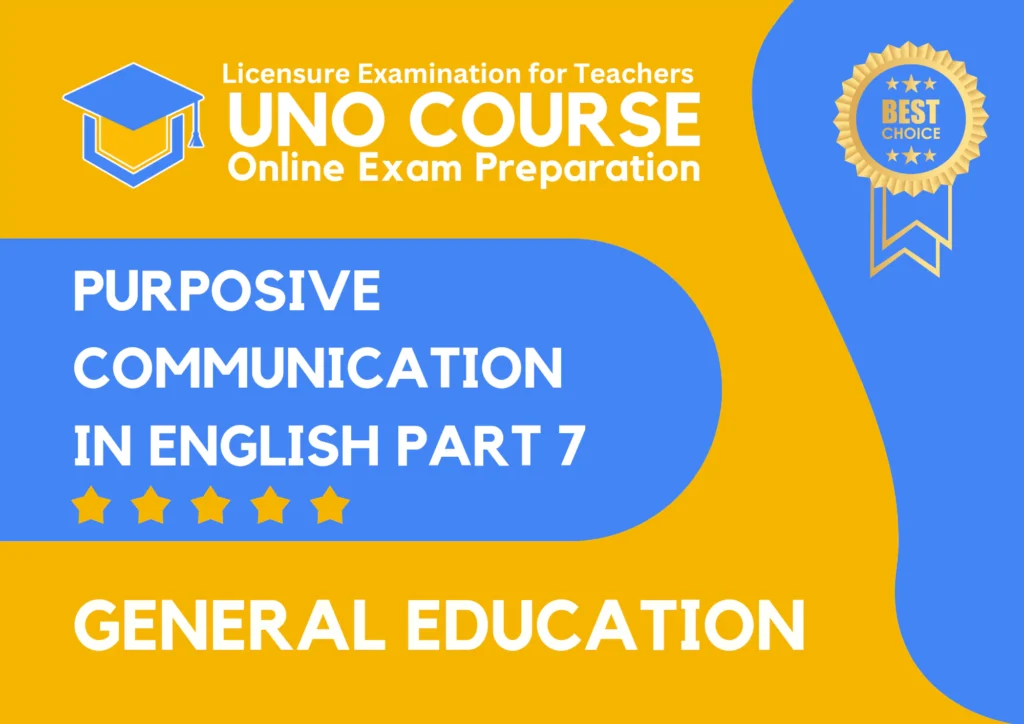
General Education in the New Curriculum – English Test 7
Purposive Communication in English
A. The meeting ended without any plans for further discussions.
B. Prices will likely drop farther next year.
C. She went farter away from her family than she had gone before.
D. I study a subject further.
A.The meeting ended without any plans for further discussions.
Farther applies to actual, physical or geographical distance.
Further applies to metaphorical distance. It also refers to time, quantity, or degree.
In other words, further indicates a continuation or extension of anything else other than distance; the word relates to more abstract references. Further is another way of saying “additional.”
Since I quit drinking I became healthier.
Because I quit drinking I no longer wake up in my own vomit.
A. Yes.
B. Only the first sentence is correct
C. Only the second sentence is correct
D. Both sentences are wrong.
A. Yes.
“Since” refers to time while “because” refers to causation.
A. Good referees must be uninterested.
B. I’m uninterested in books. I’m interested in movies.
C. Let the company call in an uninterested mediator to settle the dispute.
D. Judges and referees are supposed to be uninterested.
B. I’m uninterested in books. I’m interested in movies.
I. Sallie is disinterested in algebra.
IL Judges and referees are supposed to be disinterested
III. Let the company call in a disinterested mediator to settle the dispute.
A. II and III
B. I and III
C. I and II
D. I, II and III
A. II and III
Uninterested – means not showing any interest. “not interested”. A “disinterested” person is someone who’s impartial. To be disinterested is to lack bias.
a) Take this note to the principal.
b) Bring this note to the principal.
Which sentence is CORRECT?
A. a
B. b
C. None
D. It depends on the location of the principal.
A. a
Bring and Take
Bring is used when you want people to bring something to the place where you are.
Take is used when you take something to the place away from you.
The difference between bring and take is that of here and there. Like you bring something here and take something there.
Another tip to remember is the difference between bring and take is you “take to” while you “bring back”.
1. He alluded to a time in the past when he was young and happy.
2. The instructor referred us to page 20 in the text.
3.The refugees eluded the border patrol.
4. He illuded us into thinking he was a British earl.
Which sentence/s is are CORRECT?
A. 1 and 2
B. 1 and 3
C. 1, 2 and 3
D. 1, 2, 3 and 4
D. 1, 2, 3 and 4
Allude means “to make an indirect reference to something.”
Elude means “to avoid or evade”. Illude means “to deceive or trick”.
Don’t confuse allude with refer: refer is to make a direct reference to a specific thing.”
a. He sat besides me.
b. Beside the mortgage, I have car payments to make.
A. Yes
B. No
C. Only sentence a
D. Only sentence b
B. No.
The word “beside” is a preposition which means “alongside of”, while the word “besides” is also a preposition which means “in addition to”
Where is the error in the sentence?
A. The comma after the word “test”
B. Repeated use of the word “test”
C. “prepared“ should be prepare
D. “and etc.”
D. “and etc.”
Do not use the expression and etc. because etc. already means “and so forth.” Adding “add” makes the expression redundant.
A. “past” should be “passed”
B. “passed” should be “past”
C. No error
D. Only “past” should be used
C. No error
A. Noun
B. Verb
C. Adjective
D. Adverb
A. Noun
“Past” as a noun
“The time that has gone by; a time, or all of the time, before the present.”
“In the past, standards were higher.”
“We cannot live in the past.”
